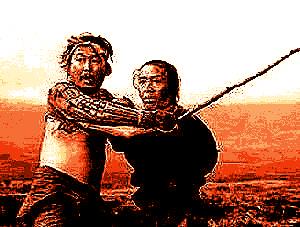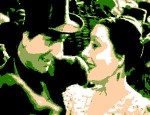Film Review
The Hidden Fortress may not be
the most highly regarded of Akira Kurosawa's great Samurai films but it
is easily one of the most accessible and entertaining. The plot
is childishly simple and the contemporary social themes that invade
much of Kurosawa's work are subtle to the point of being invisible to a
non-Japanese spectator. The last film that the director made for
Toho Studio before he set up his own film production company, it is
nothing less than a full-blown crowd-pleaser, a swashbuckling adventure
that boasts some stunning action sequences and an unexpected strong
vein of comedy. Anyone who feels intimidated by the prospect of
watching Kurosawa's more highly acclaimed masterpieces should watch
The Hidden Fortress first - there
is probably no better introduction to his work, particularly for those
unfamiliar with Japanese cinema. This was to be Kurosawa's most
commercially successful film and it won him the Silver Bear for Best
Director at the Berlin International Film Festival in 1959.
The appeal of
The Hidden Fortress
to a western audience is not hard to see. That Kurosawa was
influenced by American filmmakers - in particular John Ford - is
evident in practically every shot. Kurosawa's inspired use of
landscape, the near-perfect framing of his shots and the immaculate way
in which his action sequences are cut together show the extent to which
Ford's cinema shaped his own view of film art, which was radically
different to Japanese cinema at the time (as can readily be seen by
comparing Kurosawa's films with those of his esteemed contemporary,
Kenji Mizoguchi).
The Hidden
Fortress contains some of Kurosawa's most spectacular work, the
highpoint being a breakneck horse chase across country which culminates
in a tense, visually arresting spear duel. The slopes of Mount
Fuji provided a suitably impressive backdrop for much of the film, the
beauty of the natural locations amplified by Kurosawa's confident use
of the widescreen (Tohoscope) process, which adds much to the dramatic
power and visual grandeur of the film.
In common with much of Kurosawa's work,
The Hidden Fortress was to prove
highly influential on other filmmakers, most notably a young American
film student named George Lucas, who would incorporate many of its plot
elements into the film that would make him famous,
Star
Wars (1977). The most obvious influence is the way in
which Kurosawa constructs his narrative around two seemingly minor
characters, Tahei and Matashichi, who form a kind of Laurel and Hardy
double act, constantly bickering and getting themselves into
trouble. The more important characters in the story are less
well-developed and frequently disappear into the background, so that
our sympathies are virtually monopolised by the two cowardly
peasants. Lucas freely admits that he 'borrowed' this idea for
Star Wars, telling his story from
the point-of-view of two apparently insignificant characters, the
droids R2-D2 and C-3PO. Like
Star Wars,
The Hidden Fortress is a classic
adventure tale for young and old, in which the villains and the heroes
are well-delineated, which erupts from the screen with its action
set-pieces and which carries the spectator along with it at an
unstoppable pace, offering laughs and thrills aplenty.
© James Travers 2012
The above content is owned by frenchfilms.org and must not be copied.
Next Akira Kurosawa film:
The Bad Sleep Well (1960)
Film Synopsis
In war-torn feudal Japan, two peasants, Tahei and Matashichi, attempt
to escape across the border from their own country, but are captured by
enemy soldiers and forced into slavery. Reunited in the
course of a slave rebellion, the two men take flight and arrive at a
river, where they discover gold ornaments bearing the crest of the
royal house of Akizuki, concealed in sticks of firewood. As they
look for more hidden treasure, the two men are disturbed by an imposing
Samurai general, Rokurota Makabe, who coerces them into joining him in
his mission - to escort the Princess Yuki (who has been hiding out in a
hidden fortress with her family) to the safety of a neighbouring
country. To hide her identity, the princess poses as a mute,
but the party's progress is impeded by the need to transport the vast
haul of gold that will be needed to establish Yuki as ruler once she is
safe from her enemies. Neither the general nor the princess can
count on the loyalty of Tahei and Matashichi, who will use every
opportunity they can to run off with the gold and betray their
employers...
© James Travers
The above content is owned by frenchfilms.org and must not be copied.


